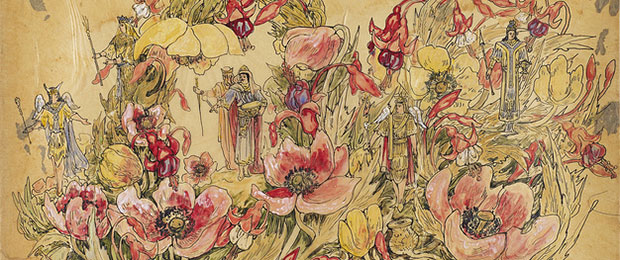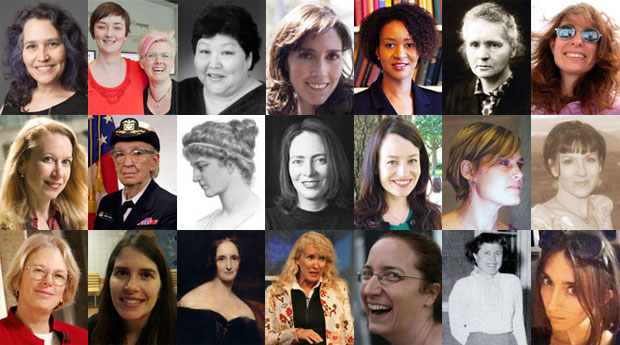- Signals from Velocity New York — “If your company is creating a diversity plan and you’ve actually gone and counted people,” Liles said, “you’ve already lost.” If you’re motivated to count, then know you’ve already lost. You want to know by how much.
- 25 Women in Robotics You Need to Know About — The DARPA Robotics Challenge (DRC) Finals 2015 were similarly lacking; of the 444 robot builders representing 24 robot entrants, only 23 builders were women (though some of the most successful teams at the DRC had female team members). Given how multidisciplinary the field is, and how many different skills are required, we need to celebrate women who are achieving greatness in robotics until we are seeing more parity. Great list.
- Awesome AWS — A curated list of awesome Amazon Web Services (AWS) libraries, open source repos, guides, blogs, and other resources.
- The Web Authentication Arms Race — Cryptography can only be used to transfer existing trust or secrecy across time or space; if the attacker impersonates the defender before the user establishes anything, it becomes impossible for the user to tell which party is legitimate. This sentence, made in solid gold Yes.
"diversity" entries

Kathryn McElroy on IBM’s design approach
The O’Reilly Design Podcast: Prototyping for digital and physical, IBM’s bet on design, and diversity in design.
Subscribe to the O’Reilly Design Podcast, our podcast exploring how experience design — and experience designers — are shaping business, the Internet of Things, and other domains.
In this week’s Design Podcast, I sit down with Kathryn McElroy, design lead on IBM’s Watson team. McElroy will be be speaking at O’Reilly’s inaugural Design Conference in January. In this episode, we talk about prototyping for digital and physical, design and diversity, and what it’s like working at IBM.
Here are a few highlights from our conversation:
I see the shift from an engineering feature-based product design to a user-centered product design across a 380,000 person company to be the most challenging but most impactful place that I can work. On a day-to-day basis, how this comes through is how we interact with our teams. As designers coming into this ecosystem, a lot of these people haven’t really heard about user-centered design until they come to our design boot camps here in Austin.That’s when we bring all of our product teams together—the business people, the engineers, and the designers—to center around their product and think about it from the user’s point of view. … What’s the most interesting about this is just the fact that it’s at this mind-boggling scale.
Specifically for physical prototyping, I learned mostly self-taught during my MFA program. I had a couple of great classes where we were focused on building electronics, and that was the first time I was introduced to it. I’ve only been doing it for three years, but it’s something you can learn on your own. There’s so many people with guidance out on the Internet and are willing to help you.

Mediating the relationship between society and technology
The O'Reilly Radar Podcast: Suw Charman-Anderson on Ada Lovelace Day, STEM, and the state of social media.
Subscribe to the O’Reilly Radar Podcast to track the technologies and people that will shape our world in the years to come.
In this week’s episode, O’Reilly’s Mac Slocum chats with Suw Charman-Anderson, journalist, consultant, and founder of Ada Lovelace Day. Their wide-ranging conversation touches on why Charman-Anderson founded Ada Lovelace Day and why it has been so successful. She also talks about the state of social media, and the past, present, and future of blogging.
Here are a few highlights from their chat:
The first Ada Lovelace Day was a day of blogging about women in tech. It was the 24th of March in 2009, which was a completely random date I had picked because I was impatient and I wanted it to happen soon. It just really took off immediately. I was quite astonished, actually. I thought it would be me and a couple of mates and we’d have a little blog thing going and that would be that. In the end, it was huge. … I think it really hit a nerve. I think there were a lot of women who were angry about the state of play and about the issues around conferences.
The main problem, not just for me but for other organizations dealing with women in STEM, is funding.
I’m a big fan of cross-pollination between different disciplines. I think there are lessons there as well for technology. Technology moves very fast, but we need to think long term about the impacts on society. We all need to be a part of that debate. That doesn’t happen enough. We tend to be very focused on who’s just done an IPO, and who’s just launched, what the new Apple device is, and all the rest of it. We need to, as a broad community, also be thinking about the long-term impacts societally, in terms of how we are bringing in different points of view. This is where diversity becomes important because different people have different experiences of the world. That should inform a longer debate on how we want to mediate the relationship between society and technology. Read more…


Four short links: 14 October 2015
Diversity Planning, Women in Robotics, AWS Resources, and Web Authentication

Signals from the 2015 O’Reilly Velocity Conference in New York
Key insights from DevOps, Web operations, and performance.
People from across the Web operations and performance worlds are coming together this week for the 2015 O’Reilly Velocity Conference in New York. Below, we’ve assembled notable keynotes, interviews, and insights from the event.
Diversity and bias
Bryan Liles, who works on strategic initiatives for DigitalOcean, gave a great thought-provoking talk on bias and diversity. “If your company is creating a diversity plan and you’ve actually gone and counted people,” Liles said, “you’ve already lost.”

Cultivate in Portland: Leadership, values, diversity
Building the next generation of leaders, for any size organization.
Register now for Cultivate NY, which will be co-located with Strata + Hadoop World NY, September 28 and 29, 2015.
At our recent Cultivate event in Portland, O’Reilly and our partnering sponsor New Relic brought together 10 speakers and more than 100 attendees to learn about corporate culture and leadership. Three themes emerged: diversity, values, and leading through humility.
Almost every speaker talked about the importance of diversity in the workplace. That’s important at a time when “maintaining corporate culture” often means building a group that’s reminiscent of a college frat house. It’s well established that diverse groups, groups that include different kinds of people, different experiences, and different ways of thinking, perform better. As Michael Lopp said at the event, “Diversity is a no-brainer.” We’re not aiming for tribal uniformity, but as Mary Yoko Brannen noted at the outset, sharing knowledge across different groups with different expectations. No organization can afford to remain monochromatic, but in a diverse organization, you have to be aware of how others differ. In particular, Karla Monterroso showed us that you need to realize when — and why — others feel threatened. When you do, you are in a much better position to build better products, to respond to changes in your market, and to use the talent in your organization effectively. Read more…

Cross-pollinating Web communities
The integration of the Web's diverse communities broadens horizons and technology.

Web projects are integration projects, combining skills from a number of disciplines. Lousy interfaces can obscure brilliant code, and ingeniously engineered back-end systems can still fail when they hit resource limits. “Content” lurks in many guises, requiring support not only from writers and illustrators but from video specialists, game designers, and many more. Marketers have built businesses on the Web, and influence conversations from design to analytics. You don’t have to be a programmer to do great work on the Web. The Web stack is vast.
Web development models include far more than code. Creating great websites and applications demands collaboration among content creators, designers, and programmers. As applications grow larger, supporting them requires adding a cast of people who can help them scale to demand. As projects grow, specialization typically lets people focus on specific aspects of those larger disciplines, supporting networking, databases, template systems, graphics details, and much more.
In some ways, that’s a recipe for fragmentation, and some days the edges are sharp. All of these communities have different priorities, which conflict regularly. Battles over resources sharpen the axes, and memories often linger.
At the same time, though, often even in environments where resources are scarce, different perspectives can reinforce each other or create new possibilities. Sometimes, it’s just because the intersection spaces have been left fallow for a long time, but other times, the combinations themselves create new opportunities. Read more…

Celebrating Ada Lovelace Day
The O'Reilly community shares stories of inspiring women in tech. Who inspired you?
October 14 is Ada Lovelace Day (ALD), an annual global event that recognizes not only the 19th century mathematician and aristocratic super nerd who wrote the first computer program, but other women in our community, too. ALD founder Suw Charman-Anderson’s goal is “to raise the profile of women in science, technology, engineering, and maths by encouraging people around the world to talk about the women whose work they admire.“
Supporting diversity is important to us, so we’re participating in ALD this year. We’ve compiled some stories of women in tech from O’Reilly staff and members of our extended family — you can read about them below.


Four short links: 10 July 2014
Journalism Security, Inclusive Technology, Network Magic, and Python Anti-Patterns
- Ex-Google Hacker Taking On The World’s Spy Agencies (Wired) — profile of the security expert working on protecting reporters.
- Meet Google’s Security Princess (Elle) — would have preferred to see her story in Wired. Much is good here, but this is pithy and strong: “If you have ambitions to create technology for the whole world, you need to represent the whole world, and the whole world is not just white men.”
- snabb switch — open source Linux userspace executable for making network appliances. Processes millions of ethernet packets per second per core. Suitable for ISPs. Speaks natively to Ethernet hardware, Hypervisors, and the Linux kernel. You can program it with LuaJIT extensions to do anything you want.
- Anti-Patterns in Python Programming — gold.


Four short links: 9 July 2014
Developer Inequality, Weak Signals, Geek Feminism Wiki, and Reidentification Risks
- Developer Inequality (Jonathan Edwards) — The bigger injustice is that programming has become an elite: a vocation requiring rare talents, grueling training, and total dedication. The way things are today if you want to be a programmer you had best be someone like me on the autism spectrum who has spent their entire life mastering vast realms of arcane knowledge — and enjoys it. Normal humans are effectively excluded from developing software. (via Slashdot)
- Signals From Foo Camp (O’Reilly Radar) — useful for me (aka “the stuff I didn’t get to see”), hopefully useful to you too. Companies outside of Silicon Valley badly want to understand it and want to find ways to truly collaborate with it, but they’re worried that conversations can turn into competition. “Old industry” has incredible expertise and operates in very complex environments, and it has much to teach tech, if tech will listen. Silicon Valley isn’t an IT department for the world, it’s the competition.
- Feminist Point of View: Lessons from Running the Geek Feminism Wiki — deck from Alex’s OS Bridge session. Today’s awareness and actions around sexism in tech resulted from their actions, sometimes directly, sometimes indirectly.
- Big Data Should Not Be a Faith-Based Initiative (Cory Doctorow) — Re-identification is part of the Big Data revolution: among the new meanings we are learning to extract from huge corpuses of data is the identity of the people in that dataset. And since we’re commodifying and sharing these huge datasets, they will still be around in ten, twenty and fifty years, when those same Big Data advancements open up new ways of re-identifying — and harming — their subjects.

Permission to be horrible and other ways to generate creativity
Denise R. Jacobs advocates for new approaches to work and community.
Author and web design consultant Denise R. Jacobs reveals lessons she learned about creativity while writing her first book. She also discusses her efforts to give women and people of color more visibility in the tech world.



